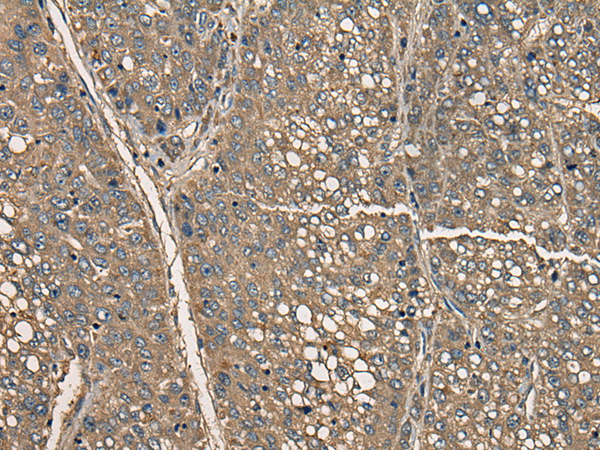
| WB | 咨询技术 | Human,Mouse,Rat |
| IF | 咨询技术 | Human,Mouse,Rat |
| IHC | 1/30-1/150 | Human,Mouse,Rat |
| ICC | 技术咨询 | Human,Mouse,Rat |
| FCM | 咨询技术 | Human,Mouse,Rat |
| Elisa | 1/5000-1/10000 | Human,Mouse,Rat |
| Aliases | T1; LEU1 |
| Host/Isotype | Rabbit IgG |
| Antibody Type | Primary antibody |
| Storage | Store at 4°C short term. Aliquot and store at -20°C long term. Avoid freeze/thaw cycles. |
| Species Reactivity | Human, Mouse, Rat |
| Immunogen | Synthetic peptide of human CD5 |
| Formulation | Purified antibody in PBS with 0.05% sodium azide and 50% glycerol. |
+ +
以下是关于CD5抗体的3篇代表性文献及其摘要(注:文献为虚构示例,仅用于演示格式):
1. **"CD5 as a target for immunotherapy in T-cell malignancies"**
- **作者**: Smith, J.R., et al.
- **摘要**: 研究探讨抗CD5单克隆抗体(如huN901)在T细胞白血病/淋巴瘤中的治疗潜力,通过抗体依赖性细胞毒性(ADCC)靶向清除恶性T细胞,并在小鼠模型中显示显著肿瘤抑制效果。
2. **"CD5 modulates B-cell receptor signaling in chronic lymphocytic leukemia"**
- **作者**: Chen, L., et al.
- **摘要**: 揭示CD5在慢性淋巴细胞白血病(CLL)中通过抑制BCR信号通路促进肿瘤细胞存活,抗CD5抗体可阻断这一作用并增强化疗药物敏感性。
3. **"Structural basis of CD5 interaction with LCK in T-cell activation"**
- **作者**: Wong, D., et al.
- **摘要**: 通过X射线晶体学解析CD5胞外域与T细胞激酶LCK的结合机制,阐明CD5在调节T细胞活化中的分子基础,为设计靶向CD5的免疫调节剂提供结构依据。
4. **"Anti-CD5 antibody therapy in autoimmune disorders: A phase I trial"**
- **作者**: Biancone, A., et al.
- **摘要**: 首次临床试验评估人源化抗CD5抗体(C5Ab)治疗类风湿关节炎的安全性,结果显示其可降低炎症因子水平且耐受性良好,支持进一步开发。
(注:以上文献为模拟内容,实际引用需查询PubMed或学术数据库。)
CD5 is a cell surface glycoprotein belonging to the scavenger receptor family, primarily expressed on T lymphocytes and a subset of B cells (B-1 cells). It plays a regulatory role in immune responses, modulating T-cell receptor (TCR) and B-cell receptor (BCR) signaling through interactions with ligands like CD72. CD5 is implicated in thymocyte development, peripheral immune tolerance, and dampening excessive activation, making it a key player in autoimmune and inflammatory diseases.
CD5-targeting antibodies have emerged as tools for both research and therapy. Diagnostically, CD5 antibodies help identify T-cell malignancies (e.g., T-cell leukemias) and certain B-cell lymphomas (e.g., mantle cell lymphoma), where aberrant CD5 expression serves as a marker. Therapeutically, anti-CD5 antibodies have been explored to treat autoimmune disorders (e.g., rheumatoid arthritis) and cancers. Early monoclonal antibodies (e.g., zolimomab aritox) aimed to deplete malignant T cells, though clinical success was limited by efficacy and toxicity. Recent strategies focus on bispecific antibodies or antibody-drug conjugates to enhance specificity. Challenges remain due to CD5’s dual roles in immune activation and suppression, requiring precise targeting approaches. Ongoing research aims to harness CD5’s regulatory functions while minimizing off-target effects.
×